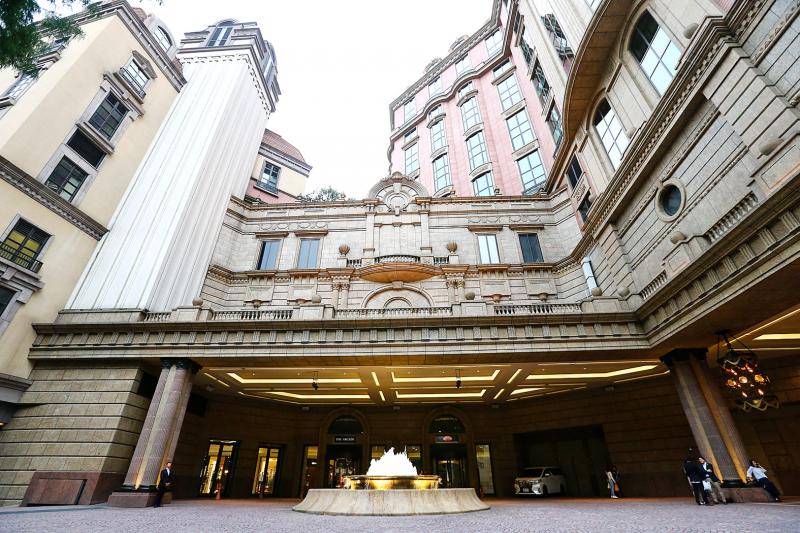Luxury hotel Mandarin Oriental Taipei (文華東方酒店) plans to reopen its guestrooms in December to take advantage of a boom in domestic travel.
The reopening would come six months after the five-star facility suspended room operations to cut costs as countries across the region impose border controls to contain the COVID-19 pandemic, diminishing demand for business travel.
“We are delighted to share that Mandarin Oriental Taipei will resume room operations on December 1,” the hotel said in a statement yesterday.

Photo: Chen Yi-kuan, Taipei Times
The hotel in Songshan District (松山) said it would adopt stringent health and safety practices to ensure the well-being of its guests and employees.
It would unveil promotion packages and other details in the run-up to the reopening, the statement said.
Mandarin Oriental, which operates 33 high-end hotels and seven residences in 23 countries and territories, has reopened its properties in Tokyo, Milan, London, Paris and Munich. It is to welcome back guests in Madrid in March next year.
Business at Mandarin Oriental Taipei’s restaurants, bars and spa, as well as conference and banquet facilities, has almost recovered to pre-pandemic levels after the outbreak was brought under control in Taiwan in May.
Hotels outside Taipei have since seen significant business improvement, as strict border controls and mandatory quarantine abroad have encouraged Taiwanese to go on domestic trips.
Mandarin Oriental Taipei is reopening at the urging of affluent local guests who are longing for luxurious staycation experiences, it said.
The hotel intends to rehire employees it let go in June, local media reported.
The hotel had opted for a partial shutdown, as foreign guests accounted for 80 percent of its clientele.
Occupancy rates remain low in general for lodging facilities in Taipei, with major players planning to offer cutthroat discounts at the annual Taipei International Travel Fair, to be held at the Taipei Nangang Exhibition Center from Friday next week to Nov. 2.
Formosa International Hotels Corp (晶華國際酒店) is to offer room and restaurant vouchers for different packages priced at about 70 to 80 percent off the regular charges to motivate customers, while Cosmos Hotel & Resorts Group (天成飯店集團) is to sell room vouchers at NT$3,699 (US$127.77) each that allow holders to stay for two nights at Cosmos Taipei (台北天成大飯店), the Taipei Garden Hotel (台北花園大酒店) or Hua Shan Din (華山町).
My Humble House Group (寒舍集團) is to offer vouchers that allow guests to stay at the Sheraton Grande Taipei Hotel (台北喜來登大飯店) for one night with free breakfast for two for NT$3,999, or a discount of 70 percent of the original price tag.

Zhang Yazhou was sitting in the passenger seat of her Tesla Model 3 when she said she heard her father’s panicked voice: The brakes do not work. Approaching a red light, her father swerved around two cars before plowing into a sport utility vehicle and a sedan, and crashing into a large concrete barrier. Stunned, Zhang gazed at the deflating airbag in front of her. She could never have imagined what was to come: Tesla Inc sued her for defamation for complaining publicly about the vehicles brakes — and won. A Chinese court ordered Zhang to pay more than US$23,000 in

Taiwan Semiconductor Manufacturing Co (TSMC, 台積電) yesterday said that its investment plan in Arizona is going according to schedule, following a local media report claiming that the company is planning to break ground on its third wafer fab in the US in June. In a statement, TSMC said it does not comment on market speculation, but that its investments in Arizona are proceeding well. TSMC is investing more than US$65 billion in Arizona to build three advanced wafer fabs. The first one has started production using the 4-nanometer (nm) process, while the second one would start mass production using the

US President Donald Trump has threatened to impose up to 100 percent tariffs on Taiwan’s semiconductor exports to the US to encourage chip manufacturers to move their production facilities to the US, but experts are questioning his strategy, warning it could harm industries on both sides. “I’m very confused and surprised that the Trump administration would try and do this,” Bob O’Donnell, chief analyst and founder of TECHnalysis Research in California, said in an interview with the Central News Agency on Wednesday. “It seems to reflect the fact that they don’t understand how the semiconductor industry really works,” O’Donnell said. Economic sanctions would

‘NO DISRUPTION’: A US trade association said that it was ready to work with the US administration to streamline the program’s requirements and achieve shared goals The White House is seeking to renegotiate US CHIPS and Science Act awards and has signaled delays to some upcoming semiconductor disbursements, two sources familiar with the matter told reporters. The people, along with a third source, said that the new US administration is reviewing the projects awarded under the 2022 law, meant to boost US domestic semiconductor output with US$39 billion in subsidies. Washington plans to renegotiate some of the deals after assessing and changing current requirements, the sources said. The extent of the possible changes and how they would affect agreements already finalized was not immediately clear. It was not known